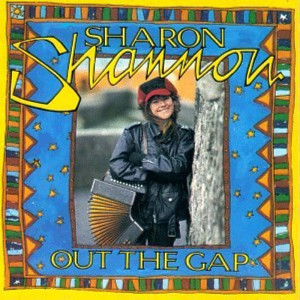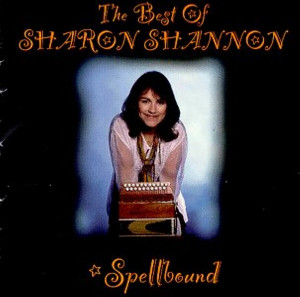 Ever wonder where the other Waterboys got to after Mike Scott left for New York? Did you suspect that the wonderful arrangements on their Fisherman’s Blues and Room to Roam owed a lot to the contributions of ensemble members – folks like John Dunford, Trevor Hutchins, and the sole Watergirl, Sharon Shannon? Of course, I didn’t ask these questions either until I saw Shannon play the Winnipeg Folk Festival a few years back, and recognized the very fine Hutchins behind Shannon on double bass, accompanied by guitarist Gerry O’Beirne.
Ever wonder where the other Waterboys got to after Mike Scott left for New York? Did you suspect that the wonderful arrangements on their Fisherman’s Blues and Room to Roam owed a lot to the contributions of ensemble members – folks like John Dunford, Trevor Hutchins, and the sole Watergirl, Sharon Shannon? Of course, I didn’t ask these questions either until I saw Shannon play the Winnipeg Folk Festival a few years back, and recognized the very fine Hutchins behind Shannon on double bass, accompanied by guitarist Gerry O’Beirne.
Peering at the liner notes and photos on Out the Gap, I saw that John Dunford produced half the songs. This theme continues on Spellbound: The Best of Sharon Shannon, where various Waterpersons round out the ensemble. In fact, the only vocals on this CD are contributed by Scott on “A Song of the Rosy Cross,” which is typical of the mystical musings he introduced on Room to Roam.
Why mention that Shannon is nothing like the accordion music known to the untutored? Why mention the Waterboy connection? Only to persuade those skeptical about anything to do with accordions to give this one a listen, and to read on.
Sharon Shannon has achieved phenomenal success in Ireland, with both her solo and ensemble efforts, such as her participation in the Waterboys, and her collaboration in the “A Woman’s Heart Tour” with Frances and Mary Black, Dolores Keane, Eleanor McEvoy and Maura O’Connell. I believe this is due in large part to her ability to bring traditional tunes into a truly contemporary context by fusing them with instruments and arrangements that please young folk-rock and country fans. She is also able to use her many illustrious guests to advantage – everyone from Winnie Horan of Solas to Adam Clayton of U2. Her accordion plays a major role here but doesn’t hog the spotlight all the time.
Both Out the Gap and Spellbound include numbers with fiddle replacing  accordion, avoiding repetition in arrangement. Both CDs are enjoyable, although if I had to choose I would probably opt for Spellbound, because it contains about half of the same tunes, and I like the new tunes on it better than the remaining tunes from Out the Gap. But if you wonder what a CD that mixes British Isles and North American tunes with the reggae sensibilities of a Caribbean producer sounds like, by all means get Out the Gap. It contains five tunes produced by Dennis Bovell, including “The Mighty Sparrow,” “Sparky,” and “The Bungee Jumpers,” which all also appear on Spellbound. “The Mighty Sparrow,” dedicated to the Caribbean artist of that name, also appears on Putumayo’s 1996 A Celtic Collection. It’s fusion, man – and it works.
accordion, avoiding repetition in arrangement. Both CDs are enjoyable, although if I had to choose I would probably opt for Spellbound, because it contains about half of the same tunes, and I like the new tunes on it better than the remaining tunes from Out the Gap. But if you wonder what a CD that mixes British Isles and North American tunes with the reggae sensibilities of a Caribbean producer sounds like, by all means get Out the Gap. It contains five tunes produced by Dennis Bovell, including “The Mighty Sparrow,” “Sparky,” and “The Bungee Jumpers,” which all also appear on Spellbound. “The Mighty Sparrow,” dedicated to the Caribbean artist of that name, also appears on Putumayo’s 1996 A Celtic Collection. It’s fusion, man – and it works.
The first number on Spellbound is almost Saw Doctor-esque. It’s a fun little romp on the accordion with that festive, easy swing that can characterize the lighter side of recent Irish music. The second song, written by Peter Oustroushko, begins with a very Waterboy-reminiscent introduction. This track and most of those that follow are pure, danceable celebrations of Shannon’s accordion. There are a couple of slow songs, such as “MacGuire & Patterson” and “Spellbound,” as well as several slow tunes sandwiched between danceable quicker numbers. Having said that, the album is relentlessly cheerful and not for the glum.
Two medleys “The Bungee Jumpers” and “The Woodchoppers” contain tunes borrowed from the Quebecois band La Bottine Souriante, called “Dedicato a Vares” and “Le Reel de Voyageurs,” respectively. “Le Reel de Voyageurs” seems to be spreading throughout Britain and Ireland on the strength of Souriante’s rendition; it also appears on Shooglenifty’s Venus in Tweeds. “The Mouth of the Tobique” and “Reel Beatrice” are also French Canadian tunes, parts of tracks 9 and 19. Cape Breton fiddling wonder Natalie McMaster plays on “The Magic Foot.” I’m not sure if the album would pass the test for Canadian content for radio play, but it’s clear that Shannon pays the Canadian traditions a great compliment by including so much of this material on her album. There are also a couple of tunes from south of the world’s longest uncontested border on Spellbound. There is a Cajun tune, “The Happy One-Step,” on track 1, and “The Fisherman’s Lilt” begins the “Bungee Jumpers” medley.
“A Bag of Cats” contains that synthesized trancelike sensibility that makes me want to dance, perhaps that’s because it is anchored with a loose, heavy drone. It could almost be Kila or Shooglenifty here, which is a big plus in my book. I like a heavy percussion influence, with a light melody teasing the dancers over top, so this and “The Magic Foot,” which follows, are my favorite tracks on Spellbound. I also like the heavy bass on “The Mighty Sparrow,” where some reggae syncopation provides a solid anchor for the tunes, and “Each Little Thing,” which uses a didjeridoo for a drone. Most of the CD is fast, fun, danceable, and traditional only in tunes and lead instruments.
(Green Linnet, 1995)
(Green Linnet, 1999)
